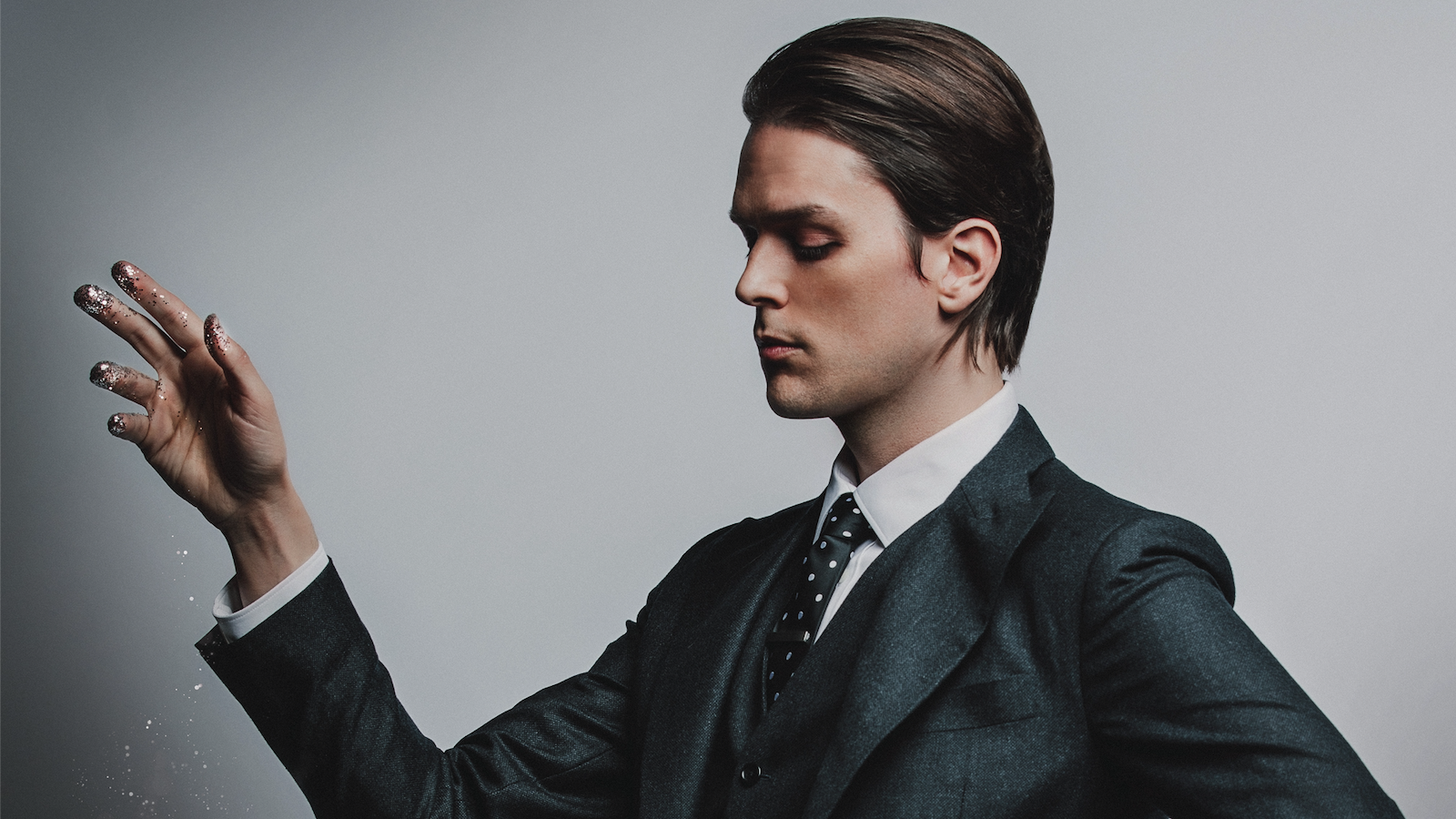iDKHow: “I have a tendency to throw everything and the kitchen sink at a recording”
Blending futuristic sounds with nostalgic attitudes, I Don't Know How But They Found Me (A.K.A. iDKHow) bring more than just the Razzmatazz to their as-titled debut album

All the latest guitar news, interviews, lessons, reviews, deals and more, direct to your inbox!
You are now subscribed
Your newsletter sign-up was successful
Few acts have managed to score major international breakouts with maniacally devoted fanbases quite the way I Don’t Know How But They Found Me (also known by their much more page space-friendly moniker, iDKHow) have – especially when you find out they did it all before even formally announcing the project.
See, iDKHow is the pairing up of two inimitably idiosyncratic alt-scene icons, Dallon Weekes and Ryan Seaman (ex‑members of Panic! At The Disco and Falling In Reverse, respectively), and iDKHow is a narratively focussed retro‑pop project as curiously quirky as it is furiously funky. It’s the perfect pastiche of household names and a truly out-there concept, and as proved by their crash-hot debut album Razzmatazz, the hype is well-earned.
Spread across a tight 12 slivers of glittery synths, roaring bass, ear-tickling effects and vocal melodies more captivating than a car crash, Razzmatazz is a surefire end-of-year list-topper for any fans of ‘80s dance-pop and hair-metal, but also just a killer body of work in its own respect. It’s wickedly fun, shamelessly experimental, and has a damn heap of replay value thanks to just how much left-field freakiness Weekes and Seaman were keen to cram in.
Before you fire up your own stream of the record (or do it right and slap the 12-inch down on your platter), check out what Weekes had to say about the making of this eagerly awaited epic.
This is the debut album for iDKHow, but through projects like The Brobecks and your stint in Panic! At The Disco, you’re certainly no stranger to “the scene”. How have you been able to funnel what you’ve learned over the years into iDKHow, to the most of this project as it grows its legs?
I think from any given pursuit – whether it’s a job, or music, or school, whatever – you take experiences with you as you go. And if you’re smart, you’ll take the good things with you and leave behind the bad. That’s certainly what I’ve tried to do, as I’ve progressed from one sphere to the next in the music world. There are things that you either experience or see, and if they resonate with you, you’ll go, “Yeah, I think I’d like to employ that in my own technique.” And the things that you don’t like or that affect you in a negative way, you leave those things behind – or at least you try to.
So between Razzmatazz and the 1981 EP, we know there’s a storyline, or a world of pseudo-fiction, in which iDKHow exists. How did you want this album to tell the next chapter in that story?
I wanted to take the story that we initially came out of the gate with, and push it in a bit of a new direction. It’s inspired a lot by artists I admired growing up – like David Bowie, who did Ziggy Stardust, or The Beatles and Sgt. Pepper; y’know, these artists who created fictional beings and stories to present their art. And just growing up in the time that I did, and the way I discovered music – that was probably the biggest inspiration for the aesthetics of iDKHow. But it’s not something I want to have to do forever. So rather than continue that same storyline, we decided to have it take a bit of a left-hand turn with this record.
Can you talk a bit more about where the project is heading from here, narratively?
Sure! The initial narrative was that [iDKHow] was a band from 40-plus years ago, which just got forgotten about over time. Which is a pretty common story, actually – there are plenty of really brilliant musicians who never really had their moment of cultural significance. A great example of that is a band called Death, from Detroit – and I discovered a lot of bands like them through the internet, so we decided to take that experience that a lot of older musicians have lived, and recreate it in a semi-fictional way. But for this new record… Without giving too much away, we’re pulling the curtain back a little bit more – there’s a little bit more to the story, if you look closely enough.
All the latest guitar news, interviews, lessons, reviews, deals and more, direct to your inbox!
How do you straddle the line between authenticity and schtick?
I don’t want to lean too hard into the conceit of the aesthetics – because y’know, they are fictional. And there are bands who certainly do lean heavily into it. A band like Ghost would be a good example – they’re playing characters on and off the stage, and that’s not necessarily something we wanted to do. We wanted to take a page out of The Beatles’ playbook: after they made Sgt. Pepper, they would still do press as themselves – they were just presenting their music with a story around it, which was meant to give their fans a space for their imagination to wander around in.
It’s just an opportunity to create more art, rather than just make 12 songs and go, “Here you go, here’s 12 songs.” To me, that would just feel like a wasted opportunity. So we’re singing and you’re writing about things that are quite real, but presenting them in a semi-fictional way. And maybe that serves a purpose other than having a way to entertain people, too – it’s almost like I’m putting a shield up in front of myself, to kind of protect myself from what I’m singing about.
I think part of it has to come down to who you and Ryan are behind the music. It’s clear that your personality – or at least the parts of it you put out there – matches the eccentricity of your art.
I never, ever want to write something that feels disingenuous, or like it doesn’t have any meaning behind it. There are plenty of artists out there who treat music like a product first and art second – they treat it more like it’s Coca-Cola than a form of expression or self-reflection. And I just can’t bring myself to do it that way.
Are you a big believer in experimentation?
Yeah! I love to experiment. I rarely get the opportunity to do that in the studio, but in the small amount of space we had to record this album with our producer [Tim Pagnotta] in LA, he was really willing to get weird with me. And that involved things like taking apart cassette tapes and recorders, and finding ways to mess up sounds and make them sound older than they really are, or invent whole new sounds.
I have a tendency to throw everything and the kitchen sink at a recording, and to have a producer on-hand to let me do that, and then subtract elements out of the recording until we had just what was needed to present the idea – that was a really great way for me to be able to work and operate. Because if we don’t try something, then I’ll always have that question mark over my head – even if I’m wrong. But if I have the opportunity to try it, then at the very least, I won’t ever have to think about it again.
Do there exist iDKHow demos that were too weird even for yourself?
No. I will never, ever limit myself to being too weird. I think that would be a mistake for any artist, to restrict what they’d allow themselves to do. What you allow yourself to put out into the world, that’s a different story. But at the very least, get it out of your head. Get it out of your system. Because who knows, maybe it’ll work!
Are you still all about the P Bass?
Yeah! The [Fender Precision Bass] is my go-to; that’s where I start and usually where I finish. Every once in a while, I’ll pull out a semi-hollow, too. On this record in particular, I recorded a lot with an Epiphone Violin Bass, which I’ve never done before, because those things are tiny and I’m, like, six-foot-three. I’ve always felt really weird on them – the Hofners have always felt like these little toys that I’m just going to break in half if I touch. But this Epiphone one had some weight to it, felt really great and just sounded amazing, so I used it a lot on this record.

Ellie Robinson is an Australian writer, editor and dog enthusiast with a keen ear for pop-rock and a keen tongue for actual Pop Rocks. Her bylines include music rag staples like NME, BLUNT, Mixdown and, of course, Australian Guitar (where she also serves as Editor-at-Large), but also less expected fare like TV Soap and Snowboarding Australia. Her go-to guitar is a Fender Player Tele, which, controversially, she only picked up after she'd joined the team at Australian Guitar. Before then, Ellie was a keyboardist – thankfully, the AG crew helped her see the light…
